A Veteran Artist, Aimee Ford Makes a New Mark Tattooing in Moline
Saturday in the Arts is a weekly feature covering a trend, subject, event or personality of local interest. It runs every Saturday morning on  your site for the best entertainment and arts coverage in the area, QuadCities.com!
your site for the best entertainment and arts coverage in the area, QuadCities.com!
You could easily say that Aimee Ford is as cool, friendly and talented AF.
The veteran artist, former waitress, and children’s art instructor owns AF Studio on the ground floor of the LeClaire Apartments building, 421 19th St., Moline, and since May 2019 the driven Ford has focused her beautiful visual eye on a new body of work – tattooing the human body.
“I’m crazy about Aimee — she’s an awesome friend, really good person to know, just fantastic,” said Liv Carrow of Moline, a 37-year-old clinical therapist who has about 30 tattoos, including three by Ford. “I am so happy she got into tattooing. It’s really a great medium for her. I have a lot of tattoos from a lot of
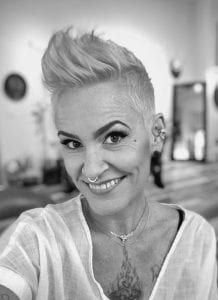
A black-and-white selfie of the artist as a cool chick.
artists, and I feel like her and her art in tattoos combine in a really seamless way.”
“Basically I really like making my body mine,” Carrow said, noting she got her first tattoo at 19, and it’s becoming much more common for women and society in general. “It’s kind of decorating myself the way that I like; it feels very powerful. I feel a lot more confidence…It’s very much like armor.”
“If you’re getting lots of tattoos, you’re probably working something out,” she added. “There’s meaning to it, beyond decoration. Women are doing whatever the hell they want generally.”
Ford – who has her business next to her photographer husband Josh’s studio, since late 2016 – has pretty much done what the hell she’s wanted since she was little.
Now 45, she grew up in Clinton, Iowa and graduated high school in Moline. Ford studied at Black Hawk College from 2006 to 2009.
A waitress for over 25 years and an artist for longer, Ford has been tested like never before in her life over the past three years.
Well known as a muralist, painter, teacher and decorator of downtown Moline windows, she began learning to tattoo in November 2017
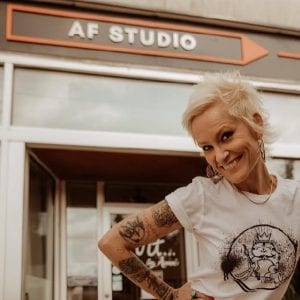
The AF tattoo studio is at the LeClaire Apartments, 421 19th St., Moline.
under the needle of her best friend, Chelsea Frame, who at the time owned Mama Chew’s Tattoo in Moline, near SouthPark Mall.
Frame has inked some of Aimee’s body art that covers most of her arms and hands. “I look like a walking piece of art,” Ford said in July 2018. At the time, she noted it was the hardest kind of art she’d ever done.
“It’s serious business. It’s definitely a big challenge, for me to get into drawing again,” Ford said then. “It’s the physical nature of what you’re doing, on another human.
“I paint a lot of memories, and that’s what tattooing is,” she said. “It’s another medium to do that. Getting into tattooing is just another platform for being involved in the sharing of memories — a very permanent platform.”
Among the memories on her body is a tattoo on her left arm of a Darth Vader drawing her son, Brody, did when he was little (he’s now nearly 18).
There are no state requirements for tattoo artist training, though most apprentices do between 18 months and three years. Ford worked with Frame about a year and a half, and her mentor opened her Happy Cat Tattoo shop in another space at Ford’s building, sharing a wall, advice, friendship and many customers.
“I felt about a year and a half was pretty OK for me; I’ve also been around the tattoo scene for a very long time,” Ford said. “I was a professional artist. Sanitation and safety were always really important to me anyway, because I was a waitress and I taught kids. It’s always been a safe space for me, keeping things extremely clean.”
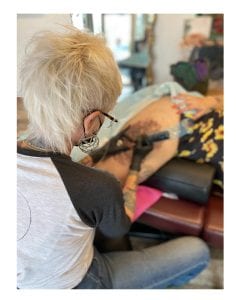
Ford at work on a customer in her Moline tattoo studio. She usually just works on one customer per day.
She started her own tattoo business in May 2019, and still feels like the new kid on the block. While customers in Moline previously had to be at least 21 to get a tattoo, it’s now 18.
“We are a fabulous little female-friendly tattoo shop,” Ford said. “Really, in my opinion it’s really cool – we are a little art corner down here.”
“The reason why I have my own establishment is because my mentor is literally next door,” she said. “I was still teaching as well, from this space. It took me almost a year – literally the beginning of March (2020) was the end of me teaching.”
Right when she was going to full-time tattoo, the Covid pandemic shut Ford’s business down for months and months.
The way she tattoos (often in spectacular, intricate detail), she draws each ahead of time and shows the customer a design before putting ink to skin (often getting a photo from them as a suggestion).
“When I was trying to think of things to kids at the same time, my creativity wasn’t giving 100 percent here or here, it was giving mild 50 percent on each end. For the betterment of my sanity as an artist, I had to choose one or the other, and I definitely chose tattooing – I love it and I don’t regret it.”
“I loved serving as well, in the food industry. I love guest service,” Ford said. “I love tattooing the most.”
After working as a waitress at Faithful Pilot, Café Fresh and TGI Friday’s, she last waitressed at the Faithful Pilot in LeClaire (part-time) in
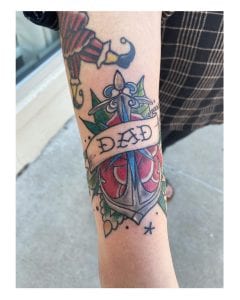
A tattoo Liv Carrow got in memory of her father, who died last August.
2018, where she did a lot of murals. “The Faithful Pilot is my biggest gallery of painting,” Ford said.
She sees many similarities in serving guests food and serving tattoos for their skin – both very intimate, personal acts. As a result, Ford has many women who have had multiple tattoos from her.
“I love my guests; I’m a guest service provider, always,” she said. “I love being, like an emotional support tattoo artist, if you will. I’m pretty open with my feelings, what I’m going through. My clients can feel that. I have cried while I’m doing a tattoo, from stuff that they tell me, and vice versa. It’s just really a safe spot here, to emote.”
She had no idea before getting into the business, how much emotion goes into tattoos.
“I have one memorial tattoo, that’s it – for my biological father,” Ford said. “I had no idea how many people would get those. It’s a big deal. You share a lot of secrets and a lot of emotions. Tattooing is not just about putting a pretty picture or a funny picture on somebody.”
Ford uses entirely disposable needles for tattooing, just once for each person. She always is masked and gloved when tattooing; requires customers to be masked, and keeps her studio very clean. Costs for gloves (vinyl and thick nitrile) have gone way up during Covid, she said.
Before Covid even started, Ford began wearing masks. “I’m on it – I’ve got the masks, they’re black and they’re cool.”
Compared to painting and drawing, tattooing is completely different. Being great at one doesn’t guarantee you’ll be any good at the other.
“It’s insanely hard,” Ford said. “I don’t know why people think they can just jump into tattooing and be good at it. It’s crazy – it’s really, really
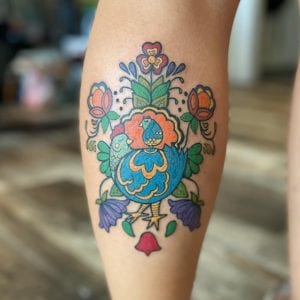
A Ford tattoo of birds and flowers.
frickin’ hard. I don’t know if it’s because I’m old; it’s hard to teach an old dog new tricks.”
“It was really difficult for me; I was just nervous,” she said. “Because I was an artist for a really long time, and I was kind of known, the pressure’s more on me to do well right off the bat. That’s not really fair – I should have a grace period of learning as well.”
Ford’s apprenticeship was also harder being exposed on social media, where people could see her work. “I didn’t just get to learn in the background,” she said. “I was so afraid of what people would think; people are really judgmental. It ended up being really nice and people are very supportive.”
Drawing a straight line on live human skin is challenging, partly because everyone’s skin is different, Ford said.
“There’s so much stuff to learn, it’s all very hard,” she said. Of Frame, she noted: “Chewy’s a great teacher, so I was lucky that way as well.”
Ford felt pressure also because tattoos are permanently on people’s skin and can be seen wherever they go.
“I’m a nervous person for everything always,” she said. “That’s just how I live. Whether people are supportive, they are. But it still makes me nervous. That’s just what I do.”
Oh, people ARE supportive
Carrow (who used to work at Faithful Pilot with Ford) got a very meaningful tattoo from her to memorialize her father, who died last August. Her dad was a Navy veteran, and Carrow asked her to design one in an anchor shape, with “Dad” in the middle and a flower visual style.
“I love this tattoo, love it for lots of reasons,” Carrow said. “She killed it.”
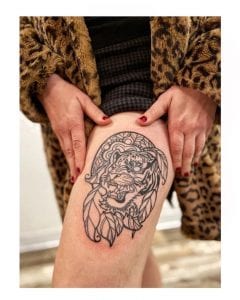
A tiger tattoo Ford did for Liv Carrow.
Working with her clients, Carrow sometimes gets nervous to see what people think of her tattoos, but in a new situation, “when people see I’m tattooed, they immediately are more comfortable. It can be a benefit. It’s way more normal now.”
“I feel like by the time Boomers are out of the workforce, no one’s going to talk about this anymore,” Carrow said of tattoos in the workforce. “I’ve taught preschool, worked at a treatment facility, in corporate environments. Every single one of those places, people figured out I had tattoos, and it wasn’t an issue. I’m doing my job.”
Her father loved her body art and would ask if she’d got new ones. “He thought it was really cool,” Carrow said, noting the Navy and military overall are very accepting of tattoos.
According to the group “Support Tattoos and Piercings at Work,” (STAPAW), the U.S. industry with highest percentage of tattooed staff is the military, and the occupation with the most lenient tattoo and piercing policies is the government. However, only 8% of government employees have ink or piercings.
Nationally, about 42 percent of Americans have at least one tattoo, and among about 7,340 tattoo artists nationwide, 25 percent are women.
STAPAW raises awareness about discrimination of piercings and tattoos in the workplace. “We don’t support employers hiring tattooed and pierced staff, we support employers hiring the most qualified candidate for the job,” its website says.
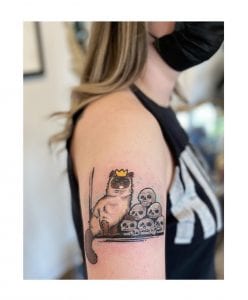
A Ford tattoo on Hillary Hansen.
“What’s nice is, mostly getting tattooed by people I’m friends with,” Carrow said of Ford. “I like getting to spend time with her — her space is really nice to be in. Before tattooing, I go down there, shoot the breeze, look at art. We have fun.”
Ford works on mostly women (mostly 20s to 40s); the male customers have to be OK with the fact “this is not a big masculine tattoo shop,” she said. “This is a very female-owned, friendly. Everything here is female – plants all over the place.”
Men usually want much bigger tattoos, and solider-themed, which Ford doesn’t normally do. She’ll send them to other places.
“I’m a cool chick to hang out with and the ladies like to hang out with me,” she joked. “It’s calm and serene. It’s just me and my guest, so there’s nobody walking around the shop.”
Hillary Hansen, a 30-year-old massage therapist who works close to Ford down 5th Avenue, got her first tattoo from her in 2019 and has gotten five others since. It helps she’s a fellow female.
“When I was younger and would go to tattoo shops, it was all men there,” Hansen said. “And if you’re getting a tattoo on a part of your body where you have to be a little exposed, all those guys are walking by looking at you. With a woman, I mean, and especially Aimee, it’s just one-on-one in there, so no one is seeing you. She makes you feel so comfortable.”
Since Covid, she has had no problems visiting Ford, being up close and personal inside.
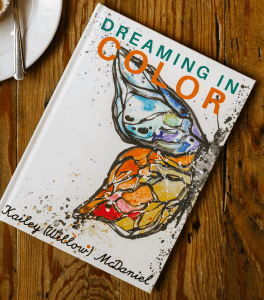
Ford did the cover artwork for McDaniel’s hair color book.
“Absolutely not. I mean, at the beginning, when they had just first opened up and things are really strict, she was doing great,” Hansen said. “You walk in, she takes your temperature right away. She’s got sanitizer. There’s a sink that you can walk right to and wash your hands; a little tray for you to keep your stuff on. She’s sanitizing your ID as you hand it to her and then sanitizing as she hands it back to you.”
She has many friends who have tattoos and often recommends Ford.
“I am constantly handing her cards out,” Hansen said. “With The Happy Cat right next door, I keep a stack of their cards on me cause people ask me. I have tattoos just up and down both of my arms. So people are always asking me where I get my work done, who does my tattoos.”
“You can always tell when something’s an Aimee Ford piece. I love it,” Hansen said. “She’s always got those little like splatters of color or making things look like a sticker. She’s always using a lot of white to make things pop. It’s really, really great.”
Kailey McDaniel, a 30-year-old hairdresser in East Moline, first got a Ford tattoo a little over a year ago, in honor of her son’s father, who died by suicide.
“I wanted to get a memorial tattoo, and she has the perfect style for it,” she said, noting she wrote on her arm the end of a note he had sent to McDaniel, with his signature. Her son, Bodhi, is now 3.
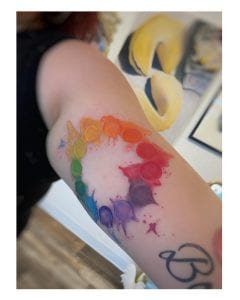
Another Ford tattoo on Kailey McDaniel.
“Honestly, I feel like it’s just creative self-expression,” McDaniel said of tattoos. “And I work in a very creative field where, luckily enough, we’re allowed to look like whatever we want. We don’t have to hide things.
“And a lot of my tattoos, I’m not someone who every single one of my tattoos means something, but they all have some sort of a happiness response to them, for the most part. And I think it’s really important to buy an artist to do them in a respectful way, in a safe way, and Aimee definitely has been one of those people.”
“I don’t know that it necessarily has so much to do with female empowerment, as it does just acceptance and community,” McDaniel said of tattoos. “Even in the hair industry, like right now, a lot of places you can work a corporate job with tattoos. There’s just a lot more self-expression that’s publicly accepted, and I think a lot of people have always been really drawn to tattoos, and at this point in time, the possibilities are endless.”
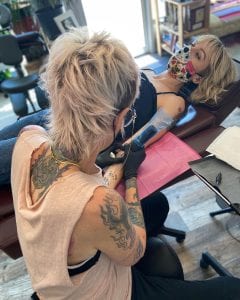
Ford apprenticed with tattoo artist Chelsea Frame for a year and a half before opening her business in 2019.
“The creative artistry that goes into her work is just very uniquely hers,” she said of Ford. “I can see someone out in public and know that they have an Aimee tattoo and just honestly, like the customer service and the care that she puts into it — I’ve never had where I go to a tattoo shop and they have not only the drawing done, but three different sizes printed up so that we’re set and ready to go, rather than having to sit and wait for the artist to draw everything out and then size it out, and it just makes for a much more pleasant experience. It feels like she’s ready for you.”
Like a hair stylist, visiting Ford is relaxing, personal and therapeutic, McDaniel said.
“I love spending time with Aimee — like sometimes we’ll listen to a murder podcast, sometimes laugh about really dark, terrible things like people that we know,” McDaniel said. “Other times we just talk about, like what’s going on in the world and how everyone is doing and doing an emotional check.”
“She very much remembers her people, and she’s very much present,” she said. “It’s something that is very much appreciated about her in our entire community. After this year, it’s important because the emotional support that people have needed has been much more than what it was previously. It’s part of what we do. Like it’s a mini-therapy session, and sometimes people really need that.”
McDaniel first hired Ford about two and a half years ago, commissioning her to paint a cover for her book, “Dreaming in Color,” a hair director’s color theory manual. “She did the most beautiful drawing on the front of it,” she said.
Body work for a Ford
Aimee also has collected a staggering amount of artwork on her skin (including hands and fingers), having been tattooed by many people, including Frame. Ford said she was “not old enough” when she got her first.
Laughing, she described herself as “that kid who drew on herself a lot.”
“Sometimes, you just always want art all over you, and that was always me,” Ford said. “I started off way before now. It’s so easy to be a
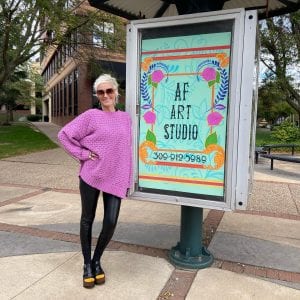
Aimee Ford designed this promo poster for her business on 5th Avenue.
tattooed person now, and that’s not how it was for a very long time. I was discriminated against, of my own choosing. I did this to myself.
“I’ve had people call me disgusting and ugly before,” she recalled. “I’ve had people not want me to wait on them before.”
When she worked at the Moline TGI Fridays for nine years, they made her cover up her body art. “I had to deal with a lot of that for years,” Ford said, noting she had most of arm tattoos done in the late ‘90s.
When she used to take her son Brody out to play years ago, people would stare hatefully at her, but Ford is a devoted mom, friendly and kind.
“I want to say the change has been in the last 10 years,” she said of tattoo acceptance, as has improvement in tattoo safety, products and equipment. “I don’t have anything crazy. I know some people who have crazy stuff on their bodies, but they also have crazy stuff in their hearts that accompany that, and I don’t.”
Most of Ford’s clients include many memorials for loved ones, pets, or handwriting tattoos, kids’ art, or flowers.
“It’s to either make you feel better about your body or you might just want a bunch of flowers on it – how beautiful is that?” she said.
Ford specializes in “whimsical realism,” she said, noting she has no problem sending people to others who do more accurate, realistic
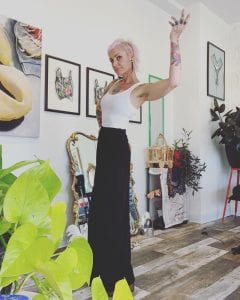
Ford inside her homey, feminine studio, which shares a wall with The Happy Cat Tattoo, also female-owned.
portraits. “We have amazing tattoo artists around here. I have no problem sending them to those places.”
As a sole proprietor, Ford couldn’t get unemployment last year until late May, and reopened in the summer. “I know a lot of tattoo artists that unemployment never went through.”
She was among many local artists to be helped financially by QC HIVE, which raised donations for many local businesses and artists over six months.
Ford’s tattoo business was jam-packed in March, with clients booked through April and May, before things shut down in mid-March.
When she was positively stung by the HIVE generosity, “That was a pretty fantastic feeling day,” Ford said. “It’s really hard as an artist to stay happy and motivated. I’ve tried so hard to keep everybody else happy and motivated, that I forgot about my own emotions.”
As a restless, active “people” person, it was very hard to be closed and quarantined, she said.
During the shutdown, Ford had a hard time being stuck at home in Rock Island. She tried to keep busy designing digital art coloring pages for kids to draw, and her family went for lots of walks and drives.
“I struggled with it,” she said. “I didn’t do well. I have a lot of energy and I don’t do good not working. I’ve never not worked. I babysat from the time I was 10 and I got a real job when I was 15 (at Moline’s Long John Silver’s).”
“I would rather be working all the time; I love to work,” Ford said.
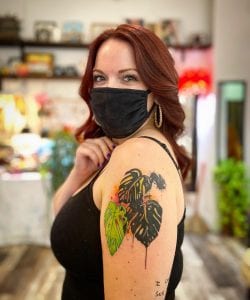
Kailey McDaniel sports an Aimee Ford tattoo.
Since being back open about nine months now, “I’m not doing face and neck tattoos ‘cause I’m still new,” she said. “The only chest tattoo I’ve done recently, I did my brother’s chest tattoo.”
“We spray everything anyway,” Ford said of being a stickler for cleanliness, noting she doesn’t allow walk-in customers, with her door locked. People can’t come in without a mask.
“Other than the masks, it was kind of business as usual,” she said of working since Covid. Many people have canceled due to Covid, and Ford normally works on just one person per day. Before the pandemic, she’d do three a day and have a student.
“Females are definitely having their time finally,” she said of tattoo artists and clients. “It’s slow. I would like to see more people of color in the industry, that’s for sure.”
For tattoo customers, Ford recommends they drink a lot of water before getting one and don’t go tanning before or after.
She doesn’t do in-person consults before tattooing, but communicates online with people, and by texting.
Ford and Frame at Happy Cat share some customers. “It’s a really positive atmosphere down here,” Ford said, noting Frame has another female artist she works with. “It’s just nice down here.”
Making some green from Botanical Center
Ford hasn’t entirely put away her paint brushes. Earlier in March, she got a two-day job painting a big new plant mural in the lobby of Quad City Botanical Center, 2525 4th Ave., Rock Island.
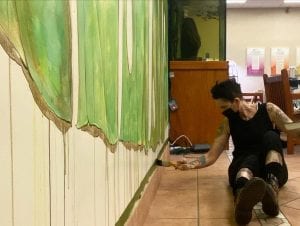
Ford working on her new mural at Quad City Botanical Center, Rock Island.
“We wanted to do the mural because we were trying to give the lobby a fresh look, opening back up with Covid,” Alicia Dierikx, the center’s guest and volunteer engagement manager, said this week. “We wanted to do a local artist.”
One of QCBC’s staff, Paige Underwood, had worked with Ford and she suggested her. Ford, assisted by her son, painted a very large leaf on one wall, to make it look like it was coming out of the Sun Garden.
“The goal was to make it look like a ginormous leaf is coming out; it looks great,” Dierikx said. “We love the watercolor, different textures she added to it. She tried to incorporate different elements.”
“I knocked that out in like two days,” Ford said proudly. “If you give me a bunch of paint, I’m on it…That thing is so beautiful; it’s huge. Like usual, my son assisted me. He’s such a big help.”
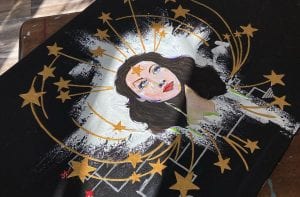
A painting Ford did of Hedy Lamarr for an exhibit at German American Heritage Center, Davenport.
Ford had done recent public murals at Tacobar in downtown Davenport and at Happy Joe’s Jungle Bungle in Davenport, in a “little jungle,” for very young kids.
“I painted a bunch of tropical plants, and hippos and elephants. It’s so cute,” Ford said of Little Jungle. In the last two years, she also did a big mural at Crawford Brew Works in Bettendorf.
Doing murals, she likes how different they are. “I don’t do tall murals because I’m afraid of heights,” Ford said, noting she’s also referred mural projects to other artists. Brody typically does the high portions of murals from a ladder.
Before Jan. 1, the Botanical Center had been open with very limited capacity (up to 50 people at a time), and since January was only open Saturdays 10 a.m. to 4 p.m. On April 1, it will open back up regular spring hours, 10 a.m. to 5 p.m. every day – except Sundays, which will be 11 a.m. to 5 p.m.
Now, the center will operate at 50 percent capacity, Dierikx said. For more information, visit www.qcgardens.com.
For a slide show of some of Ford’s work, click HERE. To contact her, visit www.facebook.com/artistaimeefordtattoos, email a.hindley@mchsi.com or text 309-912-5989.









